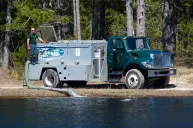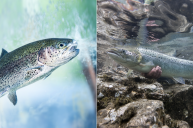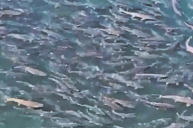With temperatures rising in Alaska's rivers, salmon populations have struggled to adapt to such changes.
According to BBC, salmon are anadromous fish, and which means they live in different habitats at various points of their lives. Importantly, the fish are born in freshwater. Moreover, salmon spend some time after their birth in freshwater, before heading to saltwater oceans. The fish head to the ocean out of necessity, as oceans offer better resources for the fish to eat and grow.
Once ready, salmon will make the trip back to the river they were born within. Once they have arrived, the fish will reproduce and then die. The process is a bit poetic, as the fish return to their original home for their final resting place.
According to Peter Westley, salmon return to their home rivers specifically because it increases their chance of survival. Westley, who is an associate professor of fisheries at the University of Alaska Fairbanks, makes the point that each river has its own unique characteristics. With such variety in temperature, rock structure and water volume, each fish is best suited to reproduce in the river they were once born in.
Salmon Populations in Decline as Rivers Grow Warmer
Salmon are known to extremely temperature-sensitive creatures. As a result, more evidence has been built to support the idea that salmon are leaning toward cooler habitats. Westley himself led a research project which confirmed that many of the species are increasingly spawning in Arctic rivers. Interestingly, these rivers were once thought to be too cold for fish to spawn within. Likewise, another study showed s shift northward in the migratory patterns of Pacific salmon.
With rising temperatures across Alaska, some species of salmon are not finding success in changing migratory patterns. In the southern half of Alaska, it appears that rising temperatures are causing a decline in the population of salmon. The fish in that region, according to Westley, are struggling with "heat stress and are dying."
Alaskan salmon are not the only fish struggling with habitat changes. A 2024 global study by the World Fish Migration Foundation produced some eye-popping results. The study showed that between 1970 and 2020, a global average decline of 81% was found in migratory freshwater fish populations.




